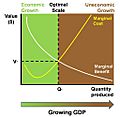Ecological economics facts for kids
Ecological economics (also known as eco-economics or ecolonomy) is a special way of looking at how human economies and Earth's natural systems work together. It's like studying how our money and jobs are connected to forests, oceans, and clean air.
This field sees our economy as a part of Earth's bigger ecosystem, not separate from it. It focuses on protecting "natural capital," which means all the valuable things nature gives us, like clean water, fertile soil, and healthy air. This is what makes it different from just "environmental economics," which often looks at nature's value in money terms. Ecological economics thinks about the long-term health of both people and the planet.
Contents
What is Ecological Economics?
Ecological economics is a field of study that brings together ideas from different areas. It combines economics with ecology, which is the study of how living things interact with their environment. It also includes ideas from sociology, ethics, and physics.
The main idea is that our human economy depends entirely on nature. We get all our resources from nature, and nature also absorbs our waste. If we use too many resources or create too much pollution, it can harm both nature and our economy.
Why is it Important?
This field helps us understand how to live on Earth without using up all its resources. It teaches us that nature has limits. For example, there's only so much clean water or so many trees. If we go beyond these limits, we can cause serious problems for the future.
Ecological economics suggests that we should focus on sustainable development. This means meeting our needs today without making it harder for future generations to meet their own needs. It's about finding a balance between economic growth and protecting our planet.
Key Ideas in Ecological Economics
Ecological economics has several important ideas that help us think about our relationship with nature.
Natural Capital
Natural capital refers to the world's stock of natural assets. These include things like forests, rivers, oceans, minerals, and the air we breathe. These assets provide us with essential services. For example, forests clean the air, and rivers provide water.
Ecological economists believe we should protect and even increase our natural capital. Just like a business needs to keep its money (financial capital) healthy, we need to keep our natural resources healthy. If we use them up too fast, we lose the ability to get those services in the future.
Sustainable Scale
This idea suggests that the human economy should not grow beyond a certain size. There's a limit to how much the Earth can provide and how much pollution it can absorb. If our economy gets too big, it can put too much pressure on the planet.
Think of it like a fish tank. If you put too many fish in a tank, the water gets dirty quickly, and the fish get sick. Similarly, if the global economy grows too large, it can overwhelm Earth's natural systems. Ecological economists look for ways to keep our economy within a safe, sustainable scale.
Fair Distribution
Ecological economics also cares about fairness. It asks: How can we share Earth's resources fairly among all people? And how can we share them fairly between people alive today and people who will live in the future?
This means thinking about how wealth and resources are distributed. It also means making sure that our actions today don't harm future generations. For example, if we pollute too much, future generations will have to deal with the consequences.
Efficient Use of Resources
This field encourages us to use resources more efficiently. This means getting the most out of what we have and wasting less. For example, using less energy, recycling more, and designing products that last longer are all ways to be more efficient.
It's not just about saving money; it's about reducing our impact on the environment. By being more efficient, we can reduce the amount of natural capital we use and the amount of waste we create.
How is it Different from Environmental Economics?
While both fields care about the environment, they have different main focuses.
Environmental economics often uses traditional economic tools to put a money value on nature. It might ask: "How much is a clean river worth?" or "What is the cost of pollution?" It often suggests solutions like taxes on pollution or trading pollution permits.
Ecological economics goes deeper. It questions the idea that economic growth can go on forever. It emphasizes that nature has its own value, not just a money value. It focuses on the limits of nature and how our economy fits within those limits. It often suggests bigger changes, like redesigning our economic system to be more sustainable.
Images for kids
-
Exergy analysis can be performed to find connections between economic value and the physical world. Here the costs of heating (vertical axis) are compared with the exergy content of different energy carriers (horizontal axis). Red dots and trend line indicate energy prices for consumers, blue dots and trend line indicate total price for consumers including capital expenditure for the heating system. Energy carriers included are district heating (D), ground-source heat pump (G), exhaust air heat pump (A), bioenergy meaning firewood (B), heating oil (O) and direct electric heating (E).
 In Spanish: Economía ecológica para niños
In Spanish: Economía ecológica para niños




